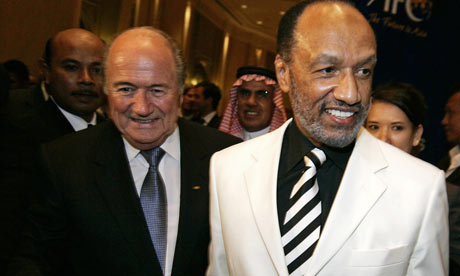So is that it then?
Should Korea, Australia and other leading candidates to stage the 2022 World Cup quietly pack up their toys and go home?
A casual reader of FIFA President Joseph Blatter’s comments in Qatar at the weekend might be forgiven for thinking so.
“The Arab world deserves to host the World Cup,” Blatter said.
“We are now nearing the end of the bidding process for the World Cups in 2018 and 2022 and Qatar is the only country bidding from the Middle East
“I was an advocate of FIFA’s rotation policy: it was important to bring the World Cup to North America and Africa.
“Now I strongly feel that the World Cup should come to Qatar.”
Stirring stuff - especially if you happen to be Qatari.
Nonetheless, there are a number of reasons why I think it would be a mistake for the gas-rich Gulf state’s rivals to despair of their chances.
For one thing, the FIFA President himself has already cautioned against reading too much into what he said.
“I did the same in Qatar as I did with Mr Medvedev and Mr Putin in Moscow,” he told the German newspaper Suddeutsche Zeitung.
“What I also did in Japan and with the Korean President.
“I have told them all, ‘Your candidacy is good, but it is not I who decides but 24 members of the Executive Committee.’
“I do that in every country.”
 Moreover, as already reported by insideworldfootball, Blatter’s visit to Qatar appears to have been partly about furthering his ambitions for another term as FIFA President.
Moreover, as already reported by insideworldfootball, Blatter’s visit to Qatar appears to have been partly about furthering his ambitions for another term as FIFA President.
Until recently, Asian Football Confederation (AFC) President Mohamed bin Hammam, a Qatari national, had been widely seen as a dangerous potential opponent for Blatter, either by running himself or supporting another candidate.
Now, following a short meeting between the two men at half-time of the Heir Apparent Cup final in Doha, that prospect has significantly receded.
When I caught up with Bin Hammam in Saudi Arabia yesterday, he spoke in terms of the start of a new era.
“We agreed…to look positively to the future,” he told me.
I would now be surprised both if Bin Hammam seeks to challenge Blatter and if Blatter does not support Bin Hammam when – in all probability – the Qatari seeks re-election to the AFC Presidency in May 2011.
It would be a mistake, furthermore, to assume, however skilled a politician the FIFA President might be, that he can just bend the ruling Executive Committee to his will on any given issue.
If come December and the decisive votes on the 2018 and 2022 tournaments, Blatter appears en route to securing another term with no credible challenger in sight, it seems reasonable to suppose that he is more likely to be in the position of owing some of his colleagues favours than of calling them in.
Even if he votes for Qatar, a majority of the Exco will not necessarily follow suit.
Finally, there are many unpredictable twists and turns still to go in this competition.
Students of the Olympic Movement will recall that when Doha recently bid for the 2016 Summer Games, the electorate - in that case the 100-plus members of the International Olympic Committee – didn’t actually get to vote on its candidacy.
I wouldn’t be totally astonished if something similar happened in this contest.
While recent events have not made me regard Qatar 2022 as a surefire winner, they have left me less positive about the prospects of the United States bid.
First, there was something about the way Blatter bracketed North America with Africa when talking about rotation that raised a suspicion in my mind that the FIFA President perhaps feels North America has had its turn.
More importantly, I then read my colleague Duncan Mackay’s report that Jack Warner, President of CONCACAF, the confederation including the US, had temporarily stepped away from his international football commitments because of next month’s national election in his native Trinidad and Tobago.
Warner’s considerable influence is potentially a powerful weapon for the US, which is the only CONCACAF nation engaged in both the 2018 and 2022 contests.
Having consulted a regional specialist, I am assured that Warner will resume his football activities whether the party of which he is chairman - the United National Congress (UNC) - wins or loses on May 24.
This ought to come as a relief to supporters of the US bid which, I feel, will need him fully engaged in second half of the year if it is to maintain its momentum.
David Owen is a specialist sports journalist who worked for 20 years for the Financial Times in the United States, Canada, France and the UK. He ended his FT career as sports editor after the 2006 World Cup and is now freelancing, including covering last year’s Beijing Olympics. An archive of Owen’s material may be found by Twitter users at www.twitter.com/dodo938.

.jpg)